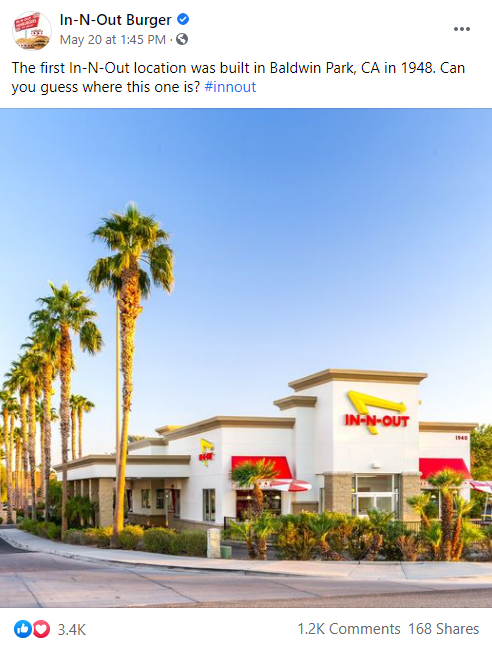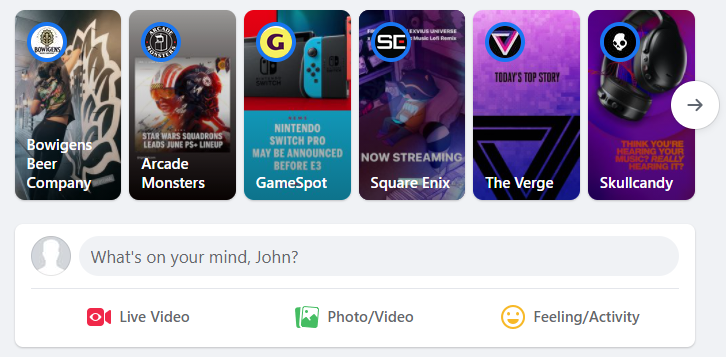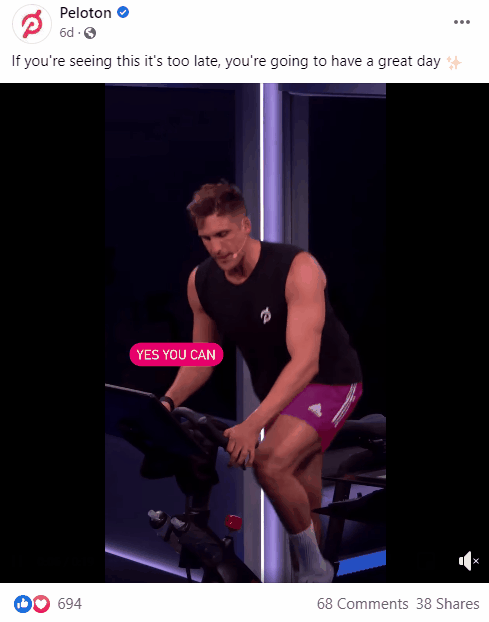Now’s the time to brush up on your Facebook best practices.
That’s because recent statistics highlight just how valuable the platform is for businesses today.
Consider that two-thirds of Facebook’s 2+ billion users interact with business Pages every week. From product research to customer service and beyond, growing a Facebook presence remains a must-do for brands.
But we’ll bite: competition is fierce and the algorithm is as fickle as ever.
Couple that with the fact that many brands still aren’t taking advantage of Facebook’s freshest features to engage customers.
That’s exactly why we put together this list of Facebook best practices to prioritize.
What are the most important Facebook best practices for business?
Below are seven crucial principles to stick to. With the help of these tips, you’ll learn:
- How to publish content that earns you reach within the Facebook algorithm
- Strategies for boosting your follower count and increasing audience engagement
- Opportunities to fine-tune your content strategy and figure out what your followers want
And with that, let’s dive in!
1. Engage your followers without forcing them to leave Facebook
If you want to expand your reach and engagement on Facebook, you should strive to keep your interactions on Facebook.
Seems simple enough, right? But take note of how many brand accounts simply drop external link after external link.
Heck, you might notice firsthand that your link-based posts get little-to-no engagement. On the flip side, question-based posts are the ones that tend to crush.

That’s no accident. Facebook tends to prioritize and rank content that keeps people on the platform. As a result, your content strategy should integrate a combination of the following:
- Videos, images, memes or infographics that don’t link out anywhere
- Questions and discussions among your followers
- Requests for followers to share their experiences, photos and so on
This isn’t to say that you shouldn’t publish external links at all: just don’t make them a cornerstone of your content calendar.
2. Use Stories to “skip the line” of the Facebook algorithm
As is the case of any social network, taking advantage of new, up-and-coming features is a smart move.
And while it took a while, Facebook Stories have finally become a staple of the platform and are being used en masse by brands.
In short, Facebook Stories allows you to publish short-form, off-the-cuff content that puts your brand front-and-center in your followers’ news feeds. This essentially allows you to bypass the Facebook algorithm and grab your followers’ attention as soon as you publish a new Story.

The upside of Facebook Stories is that they aren’t spammy and don’t run the risk of flooding your followers’ feeds. As such, frequent Stories are fair game for supplementing your main feed.
If nothing else, regularly publishing Stories is a brilliant way to invite people to check out your latest posts without worrying as much about organic reach.
3. Prioritize positive, proactive content over clickbait
Relatively new among our Facebook best practices, the platform is explicitly asking brands to publish more “inspirational” and “uplifting” content.
This isn’t just fluff, though. Facebook is actively trying to change the climate of its network following scrutiny regarding misinformation and privacy concerns in recent years.
As a result, brands should avoid trying to needlessly stir the point or post controversial clickbait for the sake of engagement. Doing so could label you as a troublemaker on the platform.
The push to publish more positive content is a cue for companies to really think about how they contribute to their industries and communities at large.
If you’re stuck on what to post that could be classified as “inspirational,” consider any combination of the following:
- Personal anecdotes and success stories
- Meaningful tips, guides and resources for your followers
- Q+A sessions that address your audience’s pain points
4. When in doubt, publish more video content
Facebook has been pretty transparent about how video is among the top-performing content on the platform.
From Facebook Live to short-form tips and tutorials, brands are spoiled for choice in terms of what they publish. If you already create social media videos elsewhere (think: Instagram or TikTok), chances are there are opportunities to cross-post your content.
Recent research in our Sprout Social Index™ also shows that video is most valuable for achieving social media goals.
Note that the platform themselves has a few of their own Facebook best practices when it comes to video, though. This includes:
- Creating some sort of introduction for your video (an intro slide or greeting) to hook viewers from the beginning
- An appropriate aspect ratio (1:1 or 9:16) for mobile devices given that most Facebook traffic comes via smartphones
- Incorporating captions for the sake of accessibility, reaching viewers watching on silent mode and added entertainment value

5. Create positive word of mouth through Groups and personal accounts
Keep in mind that your Page’s reach is always going to face an uphill battle if nobody else is promoting it.
Generating word of mouth and mentions from personal accounts is key to increasing your visibility on Facebook.
For example, it’s common for brands on Facebook to have employees share their latest posts and updates for additional reach. Through employee advocacy, you can exponentially reach more people than you could via your own followers.
Additional networking through Facebook Group marketing allows you to reach smaller but highly engaged niche audiences.
6. Answer your audience 24/7 with Instant Replies and Messaging features
Features such as Facebook Messenger empower your brand to engage with customers around the click and win new business without having to be available in real-time.
That is if you have your Instant Replies set up.
Canned messages that answer your customers’ most common questions such as your hours or availability mean that you never miss a prospect or lead when you’re “away” from your Page. Doing so shows that you’re actively trying to help customers and likewise encourages them to take the next steps toward making a purchase.
7. Regularly assess your Facebook performance via analytics
Finally, consider the role of data in fine-tuning your Facebook presence.
For example, do you know which types of posts score the most interactions? How long are people spending watching your videos? Are your followers up or down this week?
The good news is that figuring out the answers to all of the above is easier than ever.
For example, there are tons of built-in Facebook features such as Creator Studio which provides a comprehensive breakdown of all of your data points. This is especially handy if you’re running multiple Pages.

Oh, and also note how tools like Sprout Social can help you do the same.
The upside of our platform is that not only do you have all of your Facebook metrics in one place, but you can also optimize your content timing and manage all of your social assets together. Nice, right?

Checking your data is among the most important Facebook best practices as doing so encourages you to optimize your presence for more interactions.
How to increase engagement when using Facebook for business
Let’s say that your Facebook Page is up and running but you’re still struggling to score that ever-so-important engagement.
Don’t panic. Piggybacking on the best practices above, here are some quick tips to maximize your reach and move the needle on your performance metrics.
Emphasize education throughout your Facebook content
Again, you can’t just drop links or general advice and expect much traction.
Publishing legitimately useful advice in a friendly, welcoming way is the way to go if you want to win on Facebook.
It’s all about finding a balance between positioning yourself as an industry player and entertaining your audience.

Frequently ask questions and drive discussions among your followers
Integrating questions into your content strategy is a low-hanging way to get people buzzing your comments.
But again, you can’t just post general questions or fluff. You shouldn’t just publish engagement bait, either.
This post from Voodoo Doughnut is an awesome example of a thoughtful question that results in actual personalized, one-of-a-kind answers from followers.

Anything that encourages people to speak their minds or make their voices heard is a plus. Of course, just make a point to keep it civil.
Come up with a consistent content calendar and publishing frequency
Consistency counts on Facebook and you can’t just post haphazardly.
Regular updates send a signal to Facebook that says you’re looking to participate in their platform and drive discussions. When done right, this results in reach.
How often should you post, though? The answer really depends on your resources. As highlighted in our guide to creating a social media content calendar, daily posting is a-okay. That said, don’t sacrifice quality for quantity.
Similarly, research from our best times to post on social media highlights the publishing times for “optimal” engagement. Using these numbers as a general guide along with your own analytics, you can come up with a frequency that makes sense for your brand.

Respond to questions and comments (and talk to your followers like humans)
Interactions are a two-way street on Facebook. If you want more of ’em, make sure to respond to the engagements you’re already getting.
Personalized replies not only let your followers know that you’re listening but also serve as a way to highlight your brand voice and personality.

Have you mastered how to use Facebook for business?
Getting your Page off the ground is no small feat but doing so starts by understanding these Facebook best practices.
By sticking to them while experimenting with your content and tracking your data, you’ll be poised to rank in the algorithm and get the reach you’re looking for.
And speaking of data, make sure to check out our most recent report that highlights how businesses can better navigate the current social landscape.
The post 7 Fundamental Facebook best practices to grow your presence faster appeared first on Sprout Social.